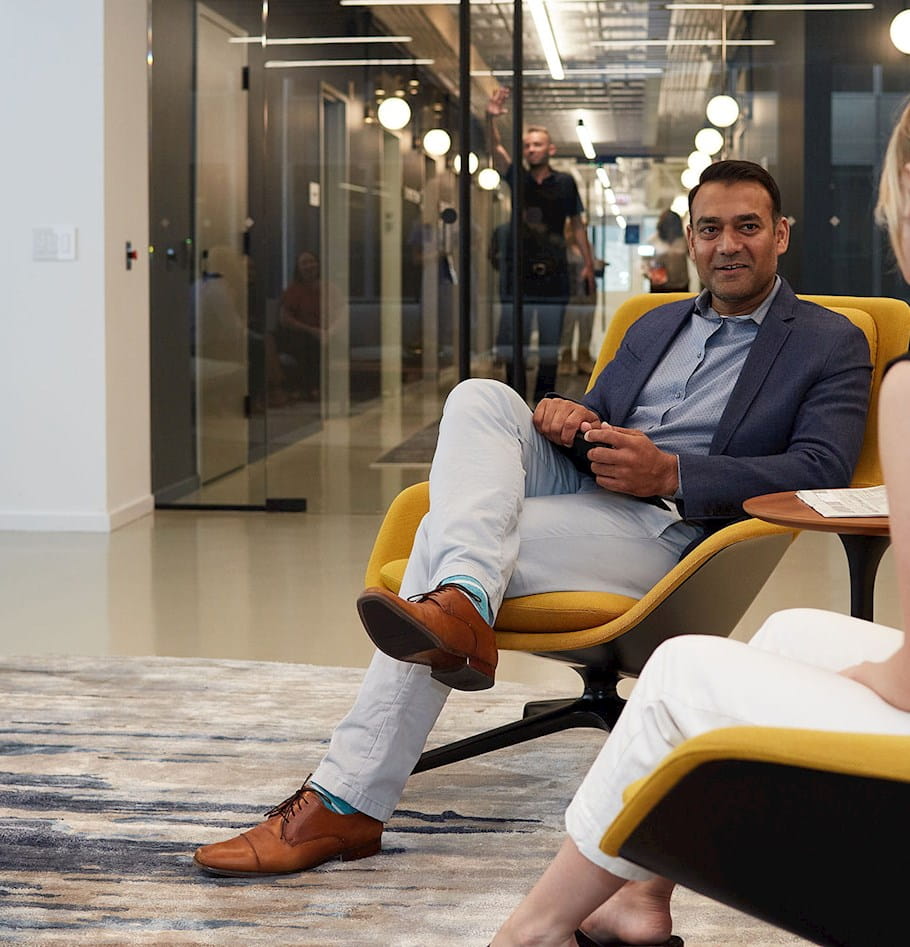
October 2019 | Q&A Spotlight
Accepting the leadership challenge: Vadim Orlov on a career in innovation
Accepting the leadership challenge: Vadim Orlov on a career in innovation
Here at West Monroe, we encourage our employees to stretch beyond their current role, take ownership for their own career growth, and embrace the spirit of ‘intrapreneurship’ to better the firm. In this series, we speak to those who have stepped up to #acceptthechallenge and become a better leader.
To kick things off, we interviewed Vadim Orlov, a member of West Monroe’s Technology practice and its first Innovation Fellow – a new role created in 2019 to recognize innovation and technology expertise. He has more than 20 years of experience architecting and designing data platforms to drive successful business transformation.
You are West Monroe’s first Innovation Fellow. Tell us a little bit more about that role and the path that led you there.
The Innovation Fellow role is different than a traditional consulting role. Typically in consulting, you’re moving from project to project, and creating custom solutions for each client. As an Innovation Fellow, I’m responsible for the development of assets that help solve problems for multiple clients. I’m trying to predict the future in a way, so that when our clients come to us with complex technology issues, we are prepared to help them solve them. That’s why I like this role – it's challenging! The role allows me to stay focused on being a deep technologist and do what I love doing, while continuing to make a significant contribution to the firm.
Prior to that, I was a senior architect focused on data engineering. For the last five years, I’ve been leading the development of our Rapid Analytics Platform (RAP), and growing it into the asset it is now. Along the way, I was having conversations with my career advisor about how develop tech talent, and we started exploring a path for senior technologists that was more technical and focused on innovation and asset development. That evolved into what is known as the Innovation Fellow role.
What does being a leader mean to you, particularly in the context of the Innovation Fellow role?
I’m bringing disruptive innovations to market, and that requires me to guide internal team members, clients, and prospects through a journey and sell them on a new idea. Naturally, some people get defensive when you are trying to change something that’s been done the same way for decades. I need to be able to articulate what I’m doing, what the benefits are, and why this new approach is better. I take a similar approach with my team internally—I need to be able to articulate a vision that they can subscribe to. There’s a lot of trial and error while developing an asset, so it’s important the whole team is in the boat and understands the end goal. The most important and most exciting part of my role is overseeing a team of technologists and helping them develop into better architects.
What’s an example of an innovation you have brought to market, and how has it impacted our firm or our clients?
The Rapid Analytics Platform (RAP) automates the creation and maintenance of data warehouses. It enables West Monroe to build platforms twice as fast compared to traditional methods, and helps us be more competitive, because we can build quickly and charge less. RAP has generated more than $15M in revenue, and we have 10 active clients currently using the asset. The biggest benefit for clients is that it allows them to integrate data from multiple, disparate sources, quickly and without a lot of the custom solutions that tends to bog down data warehousing. Then they can analyze their date more quickly and get insights faster. Both the initial configuration and total cost of ownership is lower as it’s not as customized or complicated. Some of our clients would tell us they were scared to touch their legacy data warehouse because they didn’t want to break anything, so they would come up with workarounds that weren’t scalable. RAP allows our clients to easily scale and add new data sources as their business evolves.
West Monroe asks all employees to “accept the challenge” to better themselves and the firm. What does accepting the challenge mean to you?
To me, “accept the challenge" means signing up for this ambitious goal for reinventing data warehousing. The traditional ways go back to the 70s, and I wanted to make it better. I knew there had to be a better way, versus creating manual, custom solutions and over and over again. While we haven’t fully solved this challenging goal, I feel that we’re on the good path to creating the next generation methodology, to benefit not just West Monroe but for general industry. When you take on something that established, you get a lot of pushback—people want to find holes in your idea and are naturally reluctant to change. However, I got tremendous support from technology leadership at West Monroe. They took a leap of faith, gave us resources and allowed us to pitch to clients, which requires a lot of trust. Yes, clients pushed us, but that helped us learn and evolve.
Do you have any advice for more junior technology consultants who want to own their career and perhaps even follow a similar career path?
We have a few career paths for technologists at West Monroe – you can become a manager and manage clients, you can become a principal and focus on deepening your tech expertise, or you can choose to be an architect, which fits somewhere in the middle. My advice is choose the path you are most inspired by, and don’t try to fit yourself into a box because you think that’s what you “should” do. If your goal is to get promoted as quickly as possible, I can’t give you advice – I think you should choose what you like, and focus on how to keep doing that. If that’s technical, try to find a problem worth solving—if it’s big enough, and reoccurring, it makes a great opportunity. My other piece of advice is don’t try to do it alone. Find a group that shares your interest, and find mentors who can help you along the way. My door is always open to anyone at the firm who wants to chat—I’m always happy to help.
Learn more about how our career model helps you build a career around your passions and check out our technology consulting openings.

